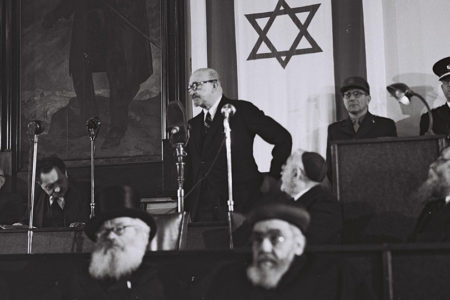The Great Divide
A look at some of the issues driving a wedge between American and Israeli Jews
Why should Israelis and American Jews see eye to eye? Americans and Israelis are not alike. They have different concerns, interests, lifestyles, and even a different calendar. Most American Jews do not speak Hebrew, nor do they treat Friday night as special, whereas more than 60 percent of Israelis observe Shabbat by lighting candles or reciting a benediction over wine before sitting down to a family-centric Friday night dinner. With all these differences and more, it’s not surprising American Jews do not make Israel a high priority when they go to the polls to vote.
Since the destruction of Jerusalem’s first Temple in 586 BC and the subsequent Babylonian Exile, there have been Jewish people living outside Israel (the Dispora). In fact, for most of the past 2,000 years, the majority have lived in the Diaspora. Today approximately 6.9 million make Israel their home, eclipsing even the U.S. Jewish population of 5.7 million.
For Americans, the exile mentality is long over. Except for the anomalous 10 percent or so on the Orthodox spectrum, the vast majority of U.S. Jews are assimilated. Merely 22 percent have kosher kitchens. Many marry non-Jews and do not raise their children as Jews.
A third of those born between the 1980s and early 2000s say they have no religion. The landmark events that defined American-Jewish identity since 1945—the Holocaust, creation of Israel, 1967 Six-Day War, and Soviet Jewry’s freedom movement—have dimmed in the collective memory. Merely 3 percent of non-Orthodox children attend Jewish day schools. And in a pathetically telling statistic, 42 percent of U.S. Jews consider having a good sense of humor crucial to their Jewish identity.
Diminishing Zionism
Across the spectrum, the American-Jewish sense of peoplehood is frayed. Many are unacquainted with the Abrahamic Covenant binding God to the Jewish people and the Jewish people to the land of Israel. This covenant forms the bedrock of Judaism. It is not that U.S. Jews can’t decide whether to take the Torah as divine revelation or as a hallowed foundational myth; it’s that most don’t even know the covenant exists.
The covenant drives political Zionism and emphasizes the bond between the Jewish people and their historic homeland. Reform Jews in America tried to create a Judaism devoid of peoplehood. (Since World War II, however, the movement has shifted from anti-Zionist to non-Zionist and now pro-Zionist.) As an alternative to peoplehood, religiosity, and ritual, Reform Judaism embraces progressive politics and social mores.
Orthodoxy went through a similar transition, with its rabbis initially opposed to Zionism. Today only a small number of ultra-Orthodox sects actively oppose Israel.
In contrast, Conservative Judaism has been Zionist from its inception, and its Rabbinical Assembly makes decisions based on halacha, or Jewish law. However, this middle-of-the-road movement is hemorrhaging members. Older observant people are staying, but the young are walking away. While Conservative rabbis can preside at same-sex marriages where both partners are Jewish, the Rabbinical Assembly forbids rabbis to officiate at interfaith weddings. Many younger rabbis find ways to circumvent this policy. The younger generation of Conservative Jews is politically indistinguishable from their Reform cousins, especially in their opposition to an Israeli presence over the Green Line (1949 armistice lines).
Identity and peoplehood for many U.S. Jews are passé. Moreover, for those Reform and Conservative Jews with merely one foot in Judaism, there is the ubiquitous drive to redefine what it means to be religiously Jewish. They have appropriated and rebranded the esoteric, Kabbalistic notion of Tikkun Olam (repairing the world) to be synonymous with progressive politics as dictated by The New York Times. Such a path leads Jews to attend redefined Passover seders and observe reimagined Yom Kippurs. They are uncomfortable with the concept of “chosenness,” seeing it as self-serving chauvinism, rather than a weighty responsibility.
With so tenuous a connection to Jewish civilization, it is little wonder many American Jews do not place Israel high on their priority list when they vote. Yet a majority still believe Israel is vital to the global Jewish future and feel an emotional attachment to the land. At the same time, most have never visited Israel and have no close family there.
Failing to Grasp Facts
To remedy the situation, thousands of young people have been brought to Israel through a Jewish program intended to connect them to their heritage. However, lately, in the name of inclusiveness, it has expanded to allow sponsors that do not embrace Zionism, as well as those partial to the Palestinian narrative. Some participants have even exploited their free trips to demonstrate against “the occupation.”
Even visitors with the best intentions fail to grasp Israel’s precarious topography. It is doubtful they realize the hills overlooking Ben Gurion Airport are in the “occupied” West Bank and that a single terrorist armed with an Iranian-supplied surface-to-air Stinger missile could shut down the country’s main airport.
Most American Jews favor establishing what they imagine would be a “demilitarized” Palestinian state. For 67 percent of Israelis, however, such an idea seems fanciful. Since the 1970s, American Jews have been led to believe they can be pro-Israel while advocating for a Palestinian state that basically returns Israel to the indefensible 1949 armistice lines.
Obliviousness to the strategic value of the West Bank and Gaza is only one element of the puzzle. Most U.S. Jews are also unfamiliar with the territorial, covenant-based component of Judaism. Jewish civilization is organic, a product of interpretation and reinterpretation. Traditions are created and recreated.
Nonetheless, there is a core: The Promised Land is central to Jewish civilization. There can be no Judaism without Israel. So many Jewish values are tied directly to the land. Consider Deuteronomy 5:16: “Honor your father and your mother, as the LORD your God has commanded you, that your days may be long, and that it may be well with you in the land which the LORD your God is giving you” (emphasis added).
Israel’s Portion of Blame
To be fair, Israel bears some responsibility for the estrangement between American and Israeli Jews. Israel has forgotten that the Diaspora has been crucial to building the country—from museums to hospitals to the Knesset to the new national library.
Increasingly, this devotion is not shown respect. Jews in the United States want to see non-Orthodox Judaism strengthened in Israel. They want non-Orthodox rabbis to be permitted to officiate at Israeli weddings. They want an area adjacent to the Western Wall where families can pray together, rather than be segregated by gender, as is the Orthodox practice.
But the Netanyahu government has done everything possible to disrespect, delegitimize, and alienate non-Orthodox American Jews. And it is hard to claim that the prime minister’s policies do not also reflect Israel’s ethos. Of course, it does not help that a plurality of Israelis—many of whom are as ignorant about the non-Orthodox streams in the United States as U.S. Jewry is about Israel—opposes setting aside any space near the Western Wall for non-Orthodox prayers.
The Trump Factor
Nothing, however, illustrates the divide between American Jews and Israel better than conflicting attitudes toward U.S. President Donald Trump. For Israelis, his election has been a godsend.
Unlike Barack Obama, Trump has not demanded unilateral Israeli concessions. Administration spokespersons do not engage in moral equivalency between Palestinian violence and Israeli reprisals, nor between Arab terrorism and the construction of Jewish housing over the Green Line. In a refreshing departure from Obama policy, the Trump administration has criticized the Palestinian-Arab leadership for its intransigence. It also moved the U.S. Embassy to Jerusalem.
When Israel faced Hamas rocket attacks in November 2018, the White House did not employ the Obama-era State Department’s mantra, calling on “both sides” to stop the violence. Washington’s backing of Israel at the United Nations is also more robust. Most important, the Trump administration has pressured Tehran. Iran is the only country in the Middle East that poses an existential threat to Israel’s survival.
For these reasons, Israelis across the political spectrum overwhelmingly approve of Trump’s policy toward Israel. Understandably, the president’s boorish demeanor and his mendacious ways are not the criteria by which he is evaluated in Jerusalem.
In stark contrast, American Jews—including conservative-leaning pundits, such as Bret Stephens, David Brooks, and Bill Kristol—see the president as an unmoored, rabble-rousing demagogue. Only 19 percent of American Jews voted for Trump, according to a recent American Jewish Committee poll. The president’s policies and bearing make Jewish people in the United States cringe.
When the FBI’s 2017 report showed a 37 percent rise in crimes targeting Jewish people and institutions, many saw a Trump connection. He is perceived as a president who fans the flames of discord, rather than a leader who tries to bring people together.
Moreover, American Jews criticized Israelis for downplaying anti-Semitism in Trump’s America and shilling for the administration. “He has destroyed all the taboos of civil discourse. And his rhetoric has emboldened and legitimized anti-Semites and other bigots,” said former Anti-Defamation League Director Abraham Foxman. In this atmosphere, Trump’s support for Israel works paradoxically to Jerusalem’s detriment.
All presidents from Lyndon Johnson forward have told American Jews that Israel had to vacate territories beyond the Green Line for its own good and that the best way they could be “pro-Israel” was to support Washington (and European) efforts to extricate Israel from the West Bank.
Trump does not seem fixated on an Israeli withdrawal; and that fact, strangely enough, is why 57 percent of Jews in America disapprove of his handling of the Arab-Israeli conflict.









I appreciate the article by Mr. Jager and his delineation of the different aspects of Judaism in the current world. The last comment was just political absurdity. Shows the world how far Jews and Christians have strayed from God’s word. And that is exactly the point. God brought the Hebrews and Israel to reality through Abraham and his descendants. Read Genesis and following. Without Yahweh and His divine protection there would be no Israel or Jewish people. God also promised in at least two passages of scripture, that whoever blessed Israel would be blessed and who ever condemned Israel would be condemned. He didn’t say who could bless. However He does know who He will condemn. And they will have a bad, fatal future. So, while the world is wrangling about the West Bank, Gaza and the Golan Heights, God is watching over Israel and guess what? He doesn’t care what you think. You are not God and never will be. I am a Christian and I love Israel and the Jews, flawed or not. They are still God’s people, and He will never break the covenant He made with Abraham. God does not go back on His word. Read chapters 60-66 of Isaiah. You will see how Yahweh deals with and blesses His people. Put the word of God in your thoughts and discard the worldly trash that invades your mind. In the end God wins. Praise His holy name. Gary
“Trump does not seem fixated on an Israeli withdrawal; and that fact, strangely enough, is why 57 percent of Jews in America disapprove of his handling of the Arab-Israeli conflict.”
So you are saying that 57 percent of us American Jews disapprove of his handling of conflict because he is not pressing for Israeli withdrawal? You know this how? Not the 57 percent, but the reason?
I as an American Jew disapprove because he lacks legitimacy almost everywhere–thus nothing he attempts will get very far.
After laying out, at length, the disastrous effects of Reform Judaism on America’s Jewry, it’s odd to read Mr. Jager’s criticism of Israelis’ opposition to normalizing & expanding the role of Reform Judaism in Israel.